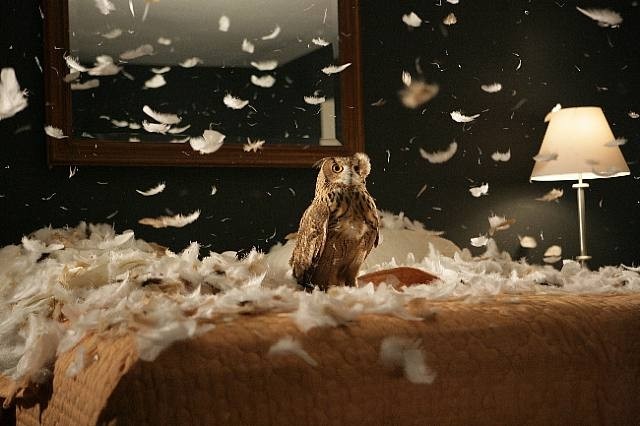Doug Aitken
08 Nov 2010 - 12 Mar 2011

© Doug Aitken
migration (empire) - linear version, 2008
Single channel video installation (color, sound)
migration (empire) - linear version, 2008
Single channel video installation (color, sound)
DOUG AITKEN
migration (empire) - linear version
08 November 2010 until 12 March 2011
migration (empire) - linear version is a work which explores a new modern landscape: an open terrain which defies borders, one that is free of regionalism and reflects an increasing homogeneity.
This is the new American landscape, where hotels become a never-ending circuit of near-sameness allowing one to catapult from city to city, crossing distance yet often never sensing change. Hotels as dwellings offer both security and isolation in this sameness. In migration (empire) - linear version indigenous American animals inhabit these hotels and motels designed to be transitional spaces for humans, yet with the humans absent, the animals become the new occupants. We watch as mammals and birds occupy and adapt to these modern synthetic environments, at times making them their own while at other moments standing in reflected silence.
Text from Doug Aitken's film treatment (synopsis)
In migration (empire) - linear version Doug Aitken poetically depicts encounters between nature and civilization. Various wild animals wander through bizarrely deserted motels in North America. Mustangs, buffaloes, pumas, raccoons, eagles and owls enter terrain that is normally reserved for people. The motels in these works are scary and reminiscent of David Lynch’s film Lost Highway. They are set in front of a surrealistic backdrop very near large oilfields. Despite this, there is no clash between animalistic ferocity and human civilization, but rather a careful, wary attempt to make contact. The animals move – some of them timidly, others curiously – through the empty, meticulously cared-for bedrooms of various motels. Although no humans are visible, they seem to be uncannily present. Switched-on televisions, coffee machines and lamps as well as running taps betray their at least temporary presence in the rooms. The result is that in addition to the picture, the sound of moving, rushing or dripping water is continually heard, accompanying migration (empire) - linear version both visually and audibly. Aitken portrays the wild animals in the sterility of the motel rooms as noble, sublime beings in a diffuse bright light. The structure of their fur, feathers or eyes is shown in close-ups. migration (empire) - linear version generates a force that is both meditative and powerful and that completely absorbs the viewer’s attention.
Anja Gossens
Translation: Elizabeth Gahbler
migration (empire) - linear version
08 November 2010 until 12 March 2011
migration (empire) - linear version is a work which explores a new modern landscape: an open terrain which defies borders, one that is free of regionalism and reflects an increasing homogeneity.
This is the new American landscape, where hotels become a never-ending circuit of near-sameness allowing one to catapult from city to city, crossing distance yet often never sensing change. Hotels as dwellings offer both security and isolation in this sameness. In migration (empire) - linear version indigenous American animals inhabit these hotels and motels designed to be transitional spaces for humans, yet with the humans absent, the animals become the new occupants. We watch as mammals and birds occupy and adapt to these modern synthetic environments, at times making them their own while at other moments standing in reflected silence.
Text from Doug Aitken's film treatment (synopsis)
In migration (empire) - linear version Doug Aitken poetically depicts encounters between nature and civilization. Various wild animals wander through bizarrely deserted motels in North America. Mustangs, buffaloes, pumas, raccoons, eagles and owls enter terrain that is normally reserved for people. The motels in these works are scary and reminiscent of David Lynch’s film Lost Highway. They are set in front of a surrealistic backdrop very near large oilfields. Despite this, there is no clash between animalistic ferocity and human civilization, but rather a careful, wary attempt to make contact. The animals move – some of them timidly, others curiously – through the empty, meticulously cared-for bedrooms of various motels. Although no humans are visible, they seem to be uncannily present. Switched-on televisions, coffee machines and lamps as well as running taps betray their at least temporary presence in the rooms. The result is that in addition to the picture, the sound of moving, rushing or dripping water is continually heard, accompanying migration (empire) - linear version both visually and audibly. Aitken portrays the wild animals in the sterility of the motel rooms as noble, sublime beings in a diffuse bright light. The structure of their fur, feathers or eyes is shown in close-ups. migration (empire) - linear version generates a force that is both meditative and powerful and that completely absorbs the viewer’s attention.
Anja Gossens
Translation: Elizabeth Gahbler
